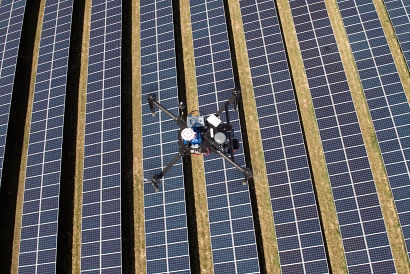
The partnership with CREST will focus on enhancing Above’s thermographic inspection services to investigate the correlation between the anomalies identified using thermal imaging and their relative power loss, an important next step in the use of aerial inspection services within the solar industry. The project will leverage AI and Deep Learning to further automate the post-processing of the large data volumes associated with large scale solar assets and deliver accurate power loss estimations to Above’s core software service, SolarGain Inspection Hub.
Above specialise in aerial inspections and data analytics, utilising drones to carry out thermographic and high-resolution inspections of utility-scale solar farms internationally. Inspection reports are delivered through the SolarGain Inspection Hub, a cloud-based software platform built in-house by Above’s experienced team of developers. SolarGain reports are an alternative to conventional PDF reports: their organic nature allows users across the solar ecosystem to easily access and utilise inspection data and imagery. This project will help Above maintain its position as a leader in the field of large-scale solar inspection, analytics and innovation.
CREST has over 20 years of experience in the research and development of innovative renewable energy technologies. Utilising state-of-the-art testing facilities and leading academics, the partnership will provide high-quality research and specialist knowledge to the project.
Innovate UK is the UK’s innovation agency. It works with people, companies and partner organisations to find and drive the science and technology innovations that will grow the UK economy.
Aerial thermographic inspections are fast emerging as a vital tool for the inspection of large-scale solar assets. The collaborators will work together to find a correlation between faults identified using aerial thermography and power loss within PV modules. It aims to provide greater insight into how identified defects can affect the power loss of a large solar asset. The research will provide us with more knowledge on the impact of module defects on the overall plant yield, leading to more informed decision making, better fault diagnosis and quicker response time; helping to keep solar farm’s performing optimally. Not only will this have commercial benefits, but it will also help safeguard the health of solar farms in the UK (and internationally), supporting the global goal of low-carbon energy generation.
Above kicked-off the project this week with CREST.
“This is an exciting project to work on, I am sure Above and the wider solar industry will benefit from the technical and commercial output of the project” said Kenan Isbilir, Technical Consultant at Above, who will be leading the project. “It is great to be working in collaboration with CREST at Loughborough University where I’ve spent my last three years completing my PhD.”
Michael Walls from Loughborough University added that CREST working together with Above, plan to be able to analyse faults in individual modules in huge solar farms using drone-based aerial thermography and that by automating the image analysis, the managers of solar farms will be able to obtain a fast and accurate assessment of the health of their assets.
For additional information:

